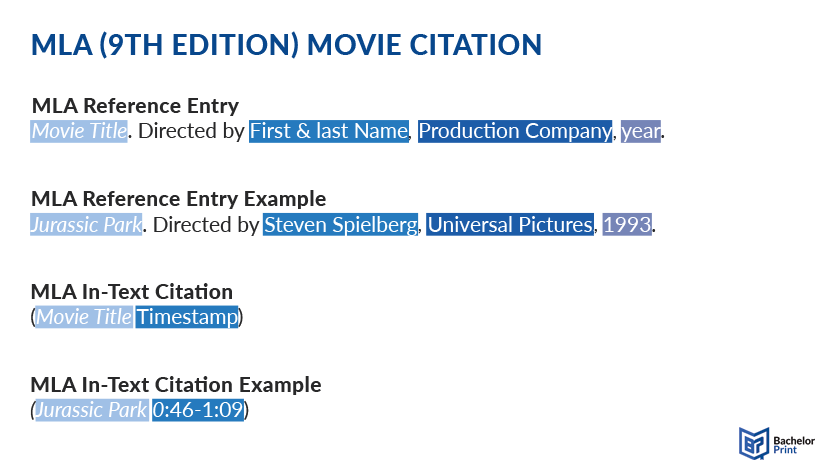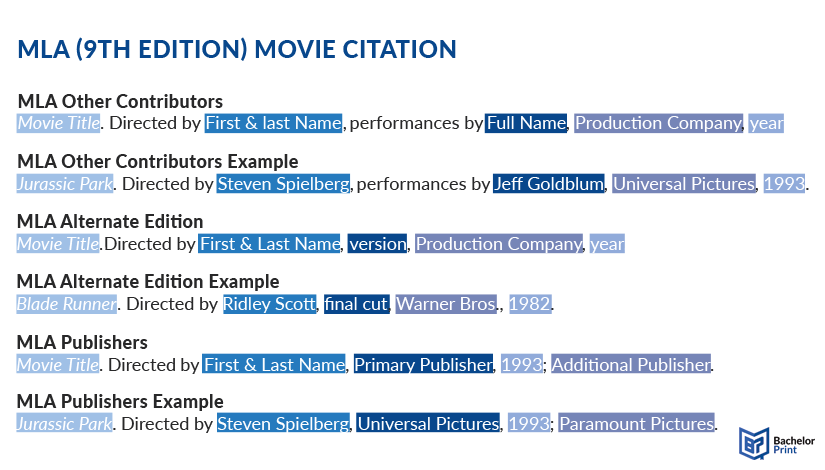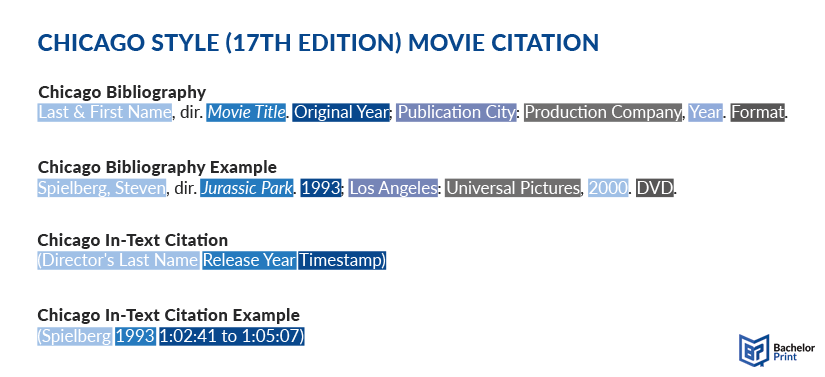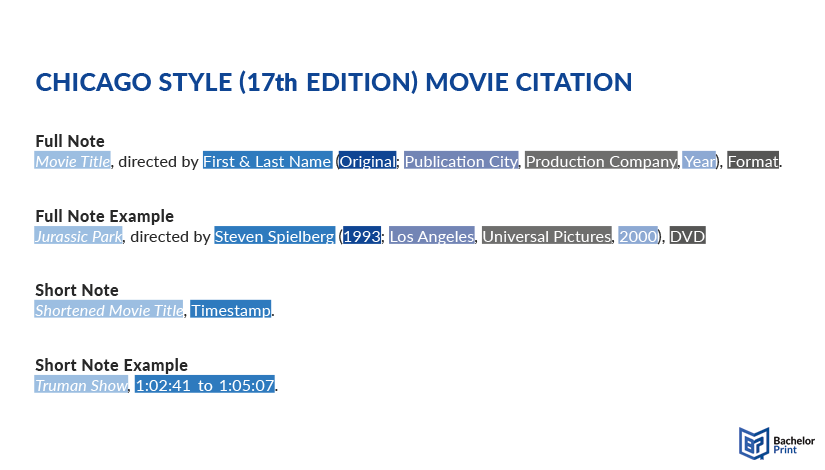
Students at universities frequently encounter difficulties in choosing the proper method for citing sources. When writing about movies and films, citing them for reference purposes is crucial, especially when it comes to academic writing. This article will elaborate on the process of how to cite a movie in various formats, and give you plenty of examples and tips on how to do it properly.
Definition: How to cite a movie
A movie citation refers to the process of formally acknowledging a movie within a written document, such as an academic essay or article. There are different types of formats when it comes to how to cite a movie, the most common ones are APA, MLA, and Chicago Style movie citation.
When citing a movie, you need to know its title, director(s), film studio(s), the year of release, and medium of publication (e.g., theatrical release, DVD, steaming service.) Depending on the citation style used, the format and placement of these elements may vary. The objective of movie citation is to give credit to the creators and to enable readers to verify the information and explore the source further if desired.
in Your Thesis
Basic source information
There is basic information that you need in order to properly cite movies, whether it’s in online or physical format. All citation guides require this information:
- Title of motion picture
- Name of the director
- Production company
- Year of release
How to cite a movie in different formats
When citing a film, it is not necessary to specify the format in which it was viewed. However, if you are writing about a specific version of the movie, you can indicate its version in the citation. There are several formatting options when it comes to citing a movie. The most common sorts of citations used, are listed below.
How to cite a movie in APA
If you’re wondering how to cite a movie in the APA style (7th edition), we have provided a template and examples, including both reference entry and APA in-text citation, for you below.
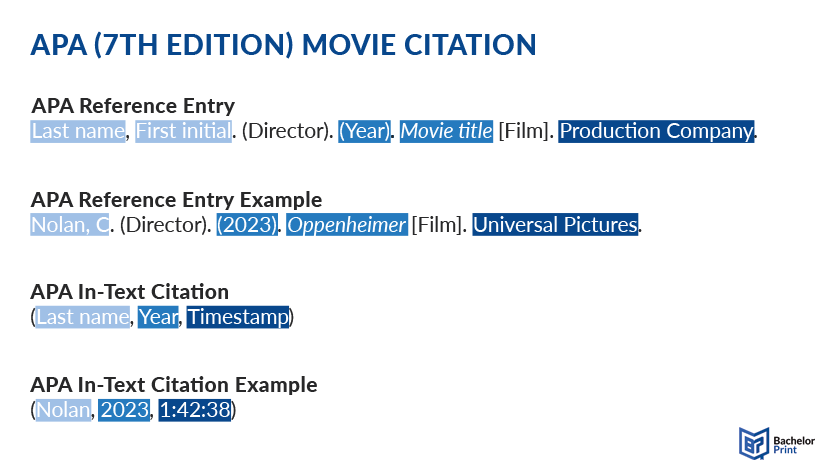
For APA movie citation, you should start by listing its director’s last name and first initial in the first section, and (Director) in brackets directly behind it. If the movie has multiple directors, you use (Directors) instead, and separate their names with commas, adding an ampersand (&) before the last name.
It is then followed by the publishing year of the movie, also in parenthetical citation. Add the title of the movie with film in brackets after it. In this format, the title is italicized and written in sentence case. If there is a specific version of the film that you’re referencing, you can add that in the film square bracket with a semicolon before the version. Lastly, add the production company to the movie citation.
Last Name, First Initial. (Director). (Year). Movie Title [Film]. Production Company.
Its in-text citation includes the director’s last name and the year of production. If you refer to a specific scene or quote from the movie, you should introduce a timestamp to direct readers to that scene.
(Last Name, Release Year, Timestamp [if relevant])
If you viewed the movie in a physical format, you should also include the medium of the movie you watched (e.g., DVD, Blu-ray, VHS), in the square bracket. Don’t forget to write the title in italics.
Director’s Last Name, First Initial (Director). (Release year). Movie title [Film; Format]. Production company,
If you watched the movie online, whether on Netflix, Hulu, or Amazon Prime Video, the format should look like this:
Director’s Last Name, First Initial. (Director). (Release Date). Movie Title [Film; Streaming Platform]. Production Company.
If you don’t know where to find all this source information, you should check out websites such as IMDb. The information on the production company can be found under the “Company Credits” module, through the “Cast & Crew” section.
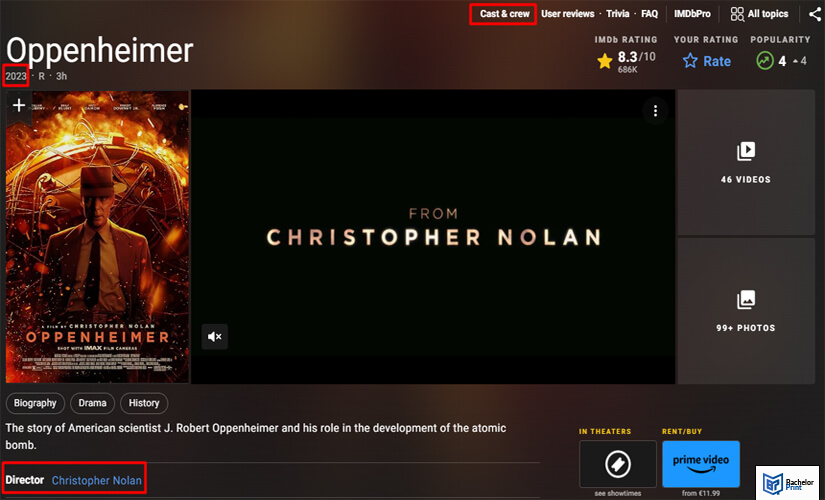
How to cite a movie in MLA
We have also created citation templates and illustrative examples on how to cite a movie in MLA format (9th edition), which you can get further information from below.
For a movie MLA citation, the italicized movie title is named in the first section, followed by the director’s full name. You should also know the production company, other relevant publishers, and the year of release. Below is the works cited format, with the director as key contributor.
Movie Title. Directed by First & Last Name, Contributor(s), Production Company, Release Year.
The in-text citation format with its director as key contributor appears as follows:
(Movie Title Timestamp)
If the information is relevant, you can add other contributors after the director. If your research paper mentions individual performances, you can include the specific actors or actresses when citing. Alternatively, you can also include the cinematographer, if you discuss the movie’s visuals.
If your writing focuses mainly on one contributor’s work, you can include their name at the start of the citation instead. This is the section, where you would normally write the director’s name. The title is always in italics. Below is a works cited example, focusing on the director and main performer.
Good Will Hunting. Directed by Gus Van Sant, performance by Matt Damon. Miramax Films, 1997.
Common contributor roles are:
- directed by
- performance by
- created by
- narrated by
- edited by
If the movie has multiple versions, you should specify which one you used, allowing the viewers to locate the relevant source. If the edition you are referencing was published after the original release, you have the option to include the year of the original data release.
While this step is not mandatory, it holds significant importance in providing context for your source, and guarantees precision of your research paper. Failing to specify the particular version may lead readers to consult the original version, potentially differing from the one discussed.
The Lord of the Rings: The Fellowship of the Ring 2001. Directed by Peter Jackson, extended edition, New Line Cinema, 2002.
It’s common for multiple companies to be involved in the production and distribution of a movie, which can make it challenging to identify the publisher. This essentially means that you need to identify the company that had primary responsibility for the movie production or distribution. You can separate the production companies with a forward slash if they were equally involved.
The Shape of Water. Directed by Guillermo del Toro, Fox Searchlight Pictures / TSG Entertainment / Double Dare You Productions, 2017.
If you watch a movie on an official streaming platform, such as Netflix, HBO, or Disney, you have the option to include details about the service in the Works Cited entry if you believe it adds relevance.
Glass Onion: A Knives Out Mystery. Directed by Rian Johnson, T-Street Productions, 2022. Netflix, 23 December 2022.
If the movie has been re-uploaded on an independent website not affiliated with the producers or authorized distributors, like YouTube, it’s typically advisable to incorporate this detail in the citation. After full details of the movie, add the name of the website, the uploader, the publishing date, and the full URL.
Woman on the Run. Directed by Norman Foster, performances by Ann Sheridan and Dennis O’Keefe, Fidelity Pictures Corporation, 1950. YouTube, uploaded by Timeless Classic Movies, 25 April 2017, https://www.youtube.com/watch?v=5use9exrj4Q.
How to cite a movie in Chicago style
A template with examples on how to cite a movie Chicago style (9th edition) can be found below.
The Chicago style movie citation is a flexible citation style, letting you choose between two options: the Chicago author-date style, also called the Turabian style, and bibliography citation with Chicago style footnotes.
When using Chicago style bibliography citing, the director’s name should be reversed, with a comma placed after the last name. Note that in this formatting style, the affiliations and titles associated with the author should be omitted. Any suffix, such as the title Sr. or Jr., should appear after the director’s name preceded by a comma.
For the author-date style, the author’s name and the date of publication are the critical elements for identifying the sources. In this style, you show that you have used a source by placing a parenthetical citation, which includes author, date, and relevant timestamps.
The format with focus on the contributors looks like this:
Last Name, First Name, dir. Movie Title. Additional Contributors [if relevant]. Production Company, Release Year. Format/URL
The in-text citation looks like this:
(Director’s Last Name Release Year, Timestamp)
Note: For movies with two or more directors/performers, you should list them in the order they’re credited in the film. Keep in mind, that only the director’s name should be reversed, while others maintain the normal order.
If you viewed the movie in a physical format, you should also include the medium of the movie you watched (e.g., Laser Disc, Blu-ray, VHS), along with a period.
Director’s Last Name, First Name, director. Movie Title. Production company, Original Release Year. Format.
If you watched the movie online, whether on Netflix, Hulu, or Amazon Prime Video, the bibliography should look like this:
Director’s Last Name, First Name, director. Movie Title. Production company, Original Release Year. Full URL.
The author-date-style format is:
Director’s Last Name, First Name, director. Movie Title. Production company, Original Release Year. Full URL.
In the text you can include information about the timings.
(Director’s Last Name Original Release Year, Timestamp)
The “full note” is equivalent to a footnote. It provides complete bibliography information for the source being cited, usually at the bottom of the page where the citation appears.
#. Movie Title, directed by First & Last Name, performances by [if relevant]. (Production Company, Original Release Year, Video/Online Release Year [if different]), Format.
Shortened footnote format looks like this:
#. Director’s Last Name, Shortened Movie Title.
How to cite a movie in a different language
Citing foreign movies requires attention to detail and adherence to specific bibliography citation styles. Whether you’re referencing a French film, a Japanese classic, or a Bollywood blockbuster, consistency and accuracy in citation are essential across documentation styles. Let’s explore how to cite a movie that’s in a different language in APA, MLA, and Chicago style.
How to cite a foreign movie in APA
You can find the APA format for how to cite a movie in a different language below.
Director’s Last Name, First Initial. (Director). (Year Published). Title in the original language [Translated title]. Production Company.
How to cite a foreign movie in MLA
The format for how to cite a movie in a different language in MLA looks like this:
Original Title [Translated Title]. Directed by First & Last Name, Production Company, Year.
How to cite a foreign movie in Chicago
The format for how to cite a movie in a different language in Chicago Style is given below:
Last Name, First Name, Original Title [Translated Title]. City: Production Company, Release Year.
FAQs
For an APA style citation, you need to know the director’s name, the release year, the movie title (in italics), and the production company.
Last Name, First Initial. (Director). (Year). Movie Title [Film]. Production Company.
With in-text citing, the citation must correspond with the first word of the works cited. When it comes to how to cite a movie in-text, you need to write the title in sentence case and in italics. If the title is extremely long, you should shorten it to the first phrase.
MLA: (Movie Title Timestamp)
APA: (Director’s Last Name, Release Year, Timestamp)
Chicago Style: (Director’s Last Name Release Year Timestamp)
When using MLA citation, the basic works cited format on how to cite a movie looks like this, with the movie title in italics.
Movie Title. Directed by First & Last Name. Production Company, Release Year.
If there are multiple production companies, you need to separate them with semicolons in APA format. The movie title is in italics.
Last Name, First Initial. (Director). (Year). Movie Title [Film]. Production Company1; Production Company2; Production Company3; Production Company4.

